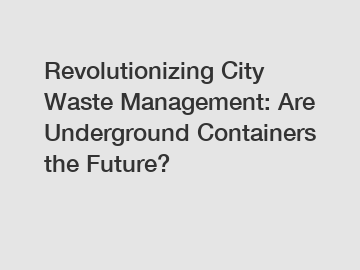Revolutionizing City Waste Management: Are Underground Containers the Future?
City waste management is a critical issue that affects the environment, public health, and quality of life in urban areas. With populations growing and urbanization accelerating, finding innovative solutions to efficiently manage waste has become more important than ever. One solution that is gaining traction is the use of underground containers for waste collection. .
These underground containers offer a unique approach to managing waste in cities by providing a more efficient and aesthetically pleasing way to collect and store garbage. By installing these containers underground, cities can free up valuable above-ground space, reduce odors and pests, and streamline the waste collection process.
One of the key advantages of underground containers is their capacity to hold large volumes of waste. Traditional above-ground bins often overflow quickly, leading to unsightly and unsanitary conditions. With underground containers, waste is stored out of sight and out of mind, helping to maintain a cleaner and more attractive urban environment.

Furthermore, underground containers can help to reduce odors and deter pests. By being stored underground, waste is less exposed to the elements, reducing the likelihood of foul smells and attracting vermin. This can help to improve public health and safety in urban areas by reducing the risk of disease transmission and keeping neighborhoods cleaner and more pleasant to live in.
In addition to their practical benefits, underground containers also offer a more aesthetically pleasing solution to waste management in cities. These containers can be equipped with sleek, modern designs that blend seamlessly into the urban landscape. By hiding waste out of sight, underground containers can help to create a more visually appealing environment for residents and visitors alike.
The efficiency of underground containers is another key advantage. With traditional waste collection systems, garbage trucks often need to make multiple stops to empty bins along a route. This can lead to traffic congestion, noise pollution, and increased greenhouse gas emissions. By consolidating waste in underground containers, collection trucks can make fewer stops, reducing their environmental impact and improving overall efficiency.
Another benefit of underground containers is their versatility. These containers can be used for different types of waste, including recyclables, organic material, and general trash. By providing separate compartments for each type of waste, cities can encourage residents to recycle more and reduce the amount of waste that ends up in landfills.
While the initial cost of installing underground containers may be higher than traditional bins, the long-term benefits make them a cost-effective solution for waste management in cities. By reducing the need for frequent collections, cities can save money on fuel, labor, and equipment maintenance. Additionally, underground containers can help to extend the lifespan of landfill sites by reducing the amount of waste that needs to be disposed of.
Overall, underground containers offer a promising solution to revolutionize city waste management. With their capacity, efficiency, aesthetics, and versatility, these containers have the potential to transform the way we think about managing waste in urban areas. By embracing this innovative technology, cities can create cleaner, healthier, and more sustainable environments for their residents. Underground containers may indeed be the future of city waste management.
For more Disc Screen Separator, China Rdf Waste To Energy, Waste Compression Machineinformation, please contact us. We will provide professional answers.
50
0
0


Comments
All Comments (0)